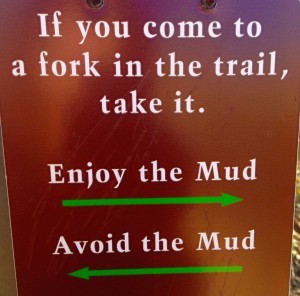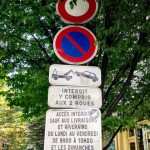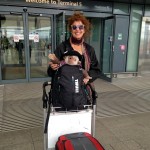 10 Tips for Traveling in Europe
10 Tips for Traveling in Europe
If travel is on your mind, may these tips for saving, safety and deeper experiences encourage you to get going! They are based on my experiences of 5 months of solo travel in Europe last summer – Spain, France and the UK. Although without a human companion, I had the company of my 30-year-old “mascot,” IggyMo, a classic Gund monkey who saved me from “selfies” and helped make many friends along the way. He chronicles his own adventures with sweet innocence of which I am happy to be reminded.
The linked pages are full of specific tips and details which apply to most travel – not just western Europe. Please share with friends via social media and elsewise.
Your feedback, questions and stories are welcome in the comments section.
1. Stay where you feel good
When it comes to discomfort, no matter the reason – claustrophobic, dirty, bad bed, noisy, negative energy, in a “dodgy” neighborhood – anytime you feel uncomfortable, unwelcome or ill at ease, find a better situation.
On the other hand, sometimes first impressions – positive or negative – are not accurate. When I arrive tired or feel vulnerable, small things like a light not working or the hot and cold faucets being reversed can send me over the edge of despair. Or, I’ve be so grateful to arrive at a destination that I overlooked the pervasive smell of blood and guts (no one mentioned the pig slaughtering plant next door) or the restaurant downstairs that turns into a rave club after midnight.
Point is, after a good look around, you decide the place isn’t for you, plot the quickest exit strategy and find a situation to relocate. For ideas on inexpensive and alternative stays, click here.
2. Know the laws and customs
 The most important law you need to know if you plan to spend more than 3 months in the European Union – as a non-EU passport holder – is the Schengen Agreement http://en.wikipedia.org/wiki/Schengen Agreement. Upon arrival in the EU you get a 3-month tourist visa, good for all the 26 EU countries, and then must leave the EU for 3 months. If you overstay, it can mean big trouble. There are no known legal ways to extend your tourist without apply from within your country of origin or residence. Stay tuned (subscribe now) for an upcoming blog I’ll post about how I received a one-year “long-stay visa” from the French Consulate.
The most important law you need to know if you plan to spend more than 3 months in the European Union – as a non-EU passport holder – is the Schengen Agreement http://en.wikipedia.org/wiki/Schengen Agreement. Upon arrival in the EU you get a 3-month tourist visa, good for all the 26 EU countries, and then must leave the EU for 3 months. If you overstay, it can mean big trouble. There are no known legal ways to extend your tourist without apply from within your country of origin or residence. Stay tuned (subscribe now) for an upcoming blog I’ll post about how I received a one-year “long-stay visa” from the French Consulate.
As for local customs, your time in any foreign country will be a lot more fun if you make an effort to learn about greetings and goodbyes, handshakes, kisses, pre-meal salutations, and at least a few words and phrases. Be aware of standard hours and days of shop and office closures, as they vary widely country-to-country and even area-to-area within a country. Local and national holidays not only affect business closings but transportation and movements of whole populations (like July and August when every popular destination is packed). To read about my adventure driving around France, click here.
3. Try to appreciate everything – It’s a journey. You chose to embark on it. There will be challenges, and how you handle them will teach you a lot about your self… and may even lead to grand adventures you wouldn’t have had otherwise.
4. Travel light – I know, everyone says this and it’s true.  If you’re going on vacation, you should be able to travel with one carry-on (rolling bag or backpack) and a second small carry-on for computer/ipad, camera and daily walk-around things.
If you’re going on vacation, you should be able to travel with one carry-on (rolling bag or backpack) and a second small carry-on for computer/ipad, camera and daily walk-around things.
Read this important article on “How and Why To Travel Light”: click here. I also wrote “Two weeks, one carry-on” in 2008. The principles are the same but some details need updating, like you can now bring your smartphone and buy a local Sim card for pay-as-you-go calls; and with the proliferation of wifi zones it’s easy to keep in touch worldwide for free via Skype, FaceTime, Google chat, ad nauseum.
5. Save money on accommodations – The biggest single expense (at home and especially while traveling) is accommodation. To learn about money-saving possibilities, click here.
6. Save money on food – Besides saving money, there’s the pleasure of the hunt, local interactions and learning about the culture through the food itself. Click here to read about great ways to save money, eat well and have more authentic dining experiences.

7. Save on Transportation: Know your budget, plan, and be very flexible – Do your research so you have a good sense of what your expenses will likely be, and add more for contingencies. For many more tips on getting to, from and around, click here.
 8. Meet Locals – Try to establish in advance at least one contact in each place you’ll be staying – someone who will meet with you – even for just a cup of coffee or glass of wine – if not host you for a night or more. Insider information will save you time, money, and likely introduce you to places, events and people you’d not know otherwise. Best of all – especially if you’re traveling alone – you won’t feel so alone. Attitude is Everything – along with integrity, respect, self-love. A pleasant attitude and smile will go much further than language skills. Want deas and resources for finding and cultivating these friendly local connections? Click here.
8. Meet Locals – Try to establish in advance at least one contact in each place you’ll be staying – someone who will meet with you – even for just a cup of coffee or glass of wine – if not host you for a night or more. Insider information will save you time, money, and likely introduce you to places, events and people you’d not know otherwise. Best of all – especially if you’re traveling alone – you won’t feel so alone. Attitude is Everything – along with integrity, respect, self-love. A pleasant attitude and smile will go much further than language skills. Want deas and resources for finding and cultivating these friendly local connections? Click here.
9. Get Travel / Medical Insurance – Why? Peace of mind. And some countries, like the UK, may require proof of it to enter. Besides the obvious negative possibilities of accident, medical emergency, dismemberment, death or lost baggage, I chose the upgraded policy from World Nomads because it offered $30,000 comprehensive and collision coverage on any rental car. When I rented a Europcar for 8 days in France, I waived the $15 a day car rental insurance, saving more than the equivalent of a month’s policy with WorldNomads. Check into it and get a free quote here. 
10. Be Fearless – Before you leave home, create a support network. With phones, text, email, social networks and free online communications, it’s easy to stay in touch. Also, be sure to leave copies of all your important information, including contacts and passwords with a trusted person. I’ve compiled a list of ways to feel and be safer on the road and at home… Click here to read it.
Now, do you feel ready to for a trip to Europe? Be in touch if you – or a friend – is headed this way!
All photos at InhabitYourDreams.com © 2014 Aysha Griffin
